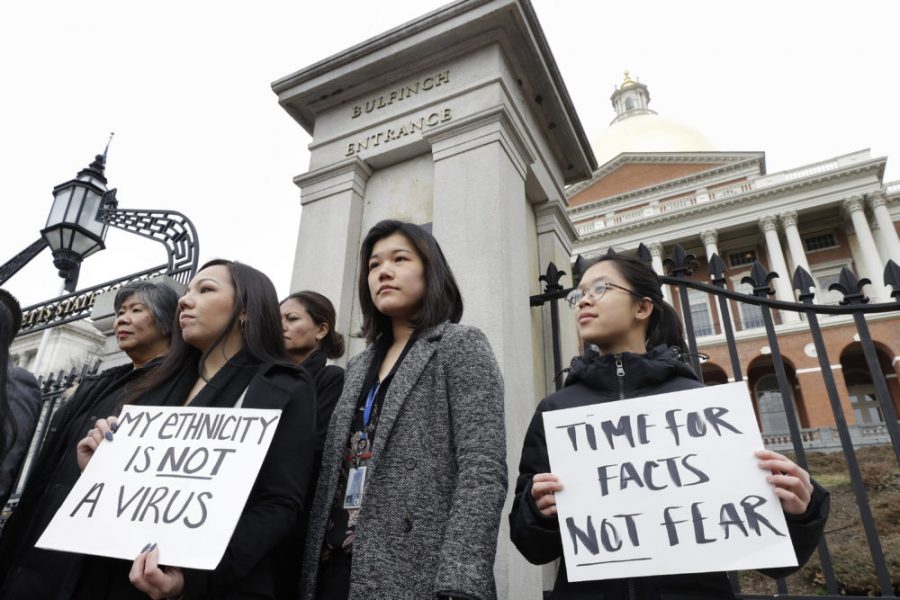COVID-19 and the Effects of Underlying Xenophobia
Protest in Boston against coronavirus racism
May 14, 2020
With the coronavirus pandemic’s worldwide quarantine already lasting well over seven weeks, everyone is in a state of boredom, worry, and stagnancy. The health concerns of this certain strand of the virus, COVID-19, are drastic enough to where most people would willingly follow self-isolation orders in attempt to flatten the curve of infections (as they should). In times of fear, people’s way of thinking gets frenzied; suddenly, clear rationale is further away from one’s reach than it should be. In correspondence to the virus’ first localized outbreak, it appears that a number of people have started to act and speak with malicious intent towards Chinese people, and even Asians in general. Is this fear because of the virus? Or, is this fear that hides behind the virus? Additionally, what does this racism mean for the future as we recover from the pandemic?
When first diving into this topic, it’s important to take into account the source of COVID-19. COVID-19’s first appearance was in Wuhan, China, where many citizens are connected to the seafood and live animal markets. The first case arrived when animal-to-person spread occurred with someone eating a bat. Some researchers believe the disease was carried or incubated in a pangolin, a harmless scaly anteater mammal that is the most smuggled animal on earth. Eventually, the virus spread through person-to-person spread.

As the virus made its way across the globe, social media suddenly blew up with accounts of xenophobia towards people of Asian descent. NextShark, “a leading source covering Asian American News and Asian News,” has created numerous articles dedicated to how events surrounding COVID-19 and Asians are unfolding.
One of their articles, written by Bryan Ke, is “Chinese-Australian Family’s Home Vandalized By Racists for Second Day in a Row.” Here, he talks about how a Chinese-Australian man and his family has been repeatedly targeted, with their garage door spraypainted and window broken. Ke then goes on to mention that their household’s CCTV footage revealed a man vandalizing their home and then immediately bolting away from the scene. Daniel Andrews, who is mentioned in the article, states that such acts of racism “won’t help us save lives” and “won’t help us save jobs.” This quote by him is important to keep in mind because while racists may possibly see their hateful actions as a form of fighting against “the source” of the virus, it really isn’t. A virus appearing among a certain group of people does not mean that the entire group of people around the world is automatically associated with the virus. Nor are they infected with it or carrying it.
In another article from NextShark, written by Carl Samson, a survey has found that “32% of Americans have seen Asians attacked over COVID-19.” While 32% doesn’t seem very large, it should be noted that 32% of people witnessing an atrocity such as xenophobia is not something to be comforted by.
The survey then discusses how most of its respondents (56%) see the pandemic as a natural disaster, but the other 44% believe a particular group of people is to blame. Of the people who believe in blame, a majority blame China and its citizens. It’s true that these percentages aren’t the majority of the categories they’re trying to measure, but they’re high enough to be concerning and clearly evident of racism.
As an Asian-American myself, I’ve been bullied and discriminated against just for my race and appearance. As I grew older, things improved. Throughout the years, people just grow up and learn about these types of social issues. It’s crazy to think that even though it’s the modern year of 2020, people are still ignorant and racist and that they will lash out and physically harm someone just for how they look. Even though they have no connection to the problem at all, they still get blamed.
Yes, the virus first appeared in Wuhan. No, not every Chinese or Asian person is suddenly infested with the virus. It’s harsh to say, but some people are honestly not even thinking at all if they believe they can generalize entire populations of people for a single problem that originated in a mere fraction of said populations.
Now, to address the question posed at the start of this article– is this fear as a result of the virus, or is this fear that merely uses the virus as an excuse? Really, it could be both.
It’s a given that people who use the virus as an excuse to be racist are “off their rockers,” but if people are only now being racist , then I believe from the start, there was something already wrong with their way of thinking. It doesn’t matter if someone was or if someone was not already racist, if they’re being racist at all, then they need to find some sense and utilize it.
It’s never right to treat someone badly because of a trait and overarching dilemma they have absolutely no control or influence over.
Everyone wants the quarantine to be over, that’s not a question, it’s a desire. However, as an Asian, I find the thought of going outside again in public a scary proposition for the near future. If people are angry and aggressive towards us now, in times of isolation, how are they going to treat us when everyone is finally allowed outside?
It’s 2020 and people are still so petty over the mere fact that people’s skin colors are like two shades different. This situation doesn’t help anyone, considering how some people now have a “reason” (albeit a weak one) to be xenophobic.
There are talks in government and health departments of the recovery taking some more months out of our daily lives–life won’t immediately go back to normal. Who knows what can happen in people’s minds during this adjustment period?
I can only say that as I hope this situation will quickly improve for everyone, I also hope people will learn to be more understanding of others–no matter where they come from.



